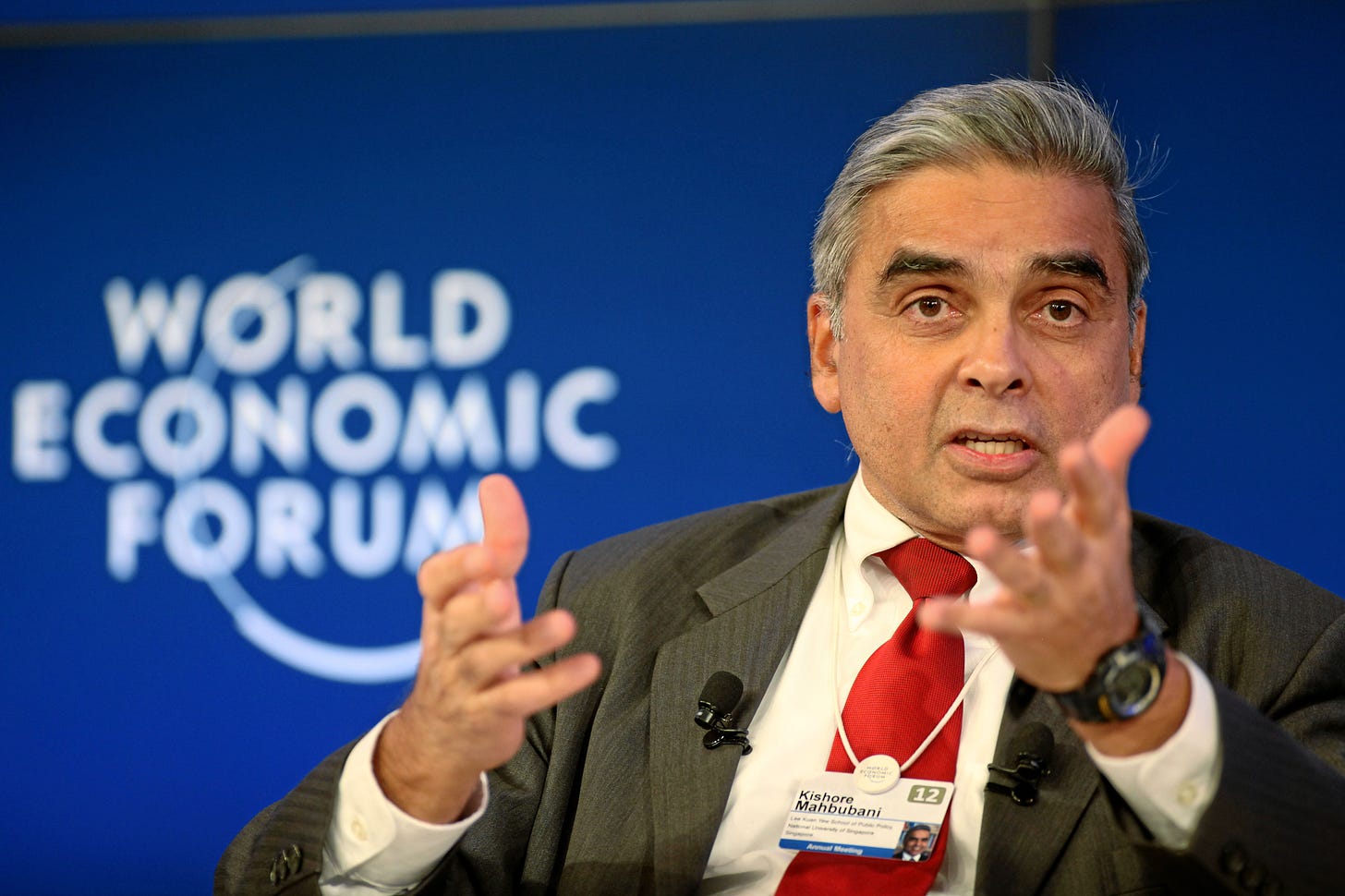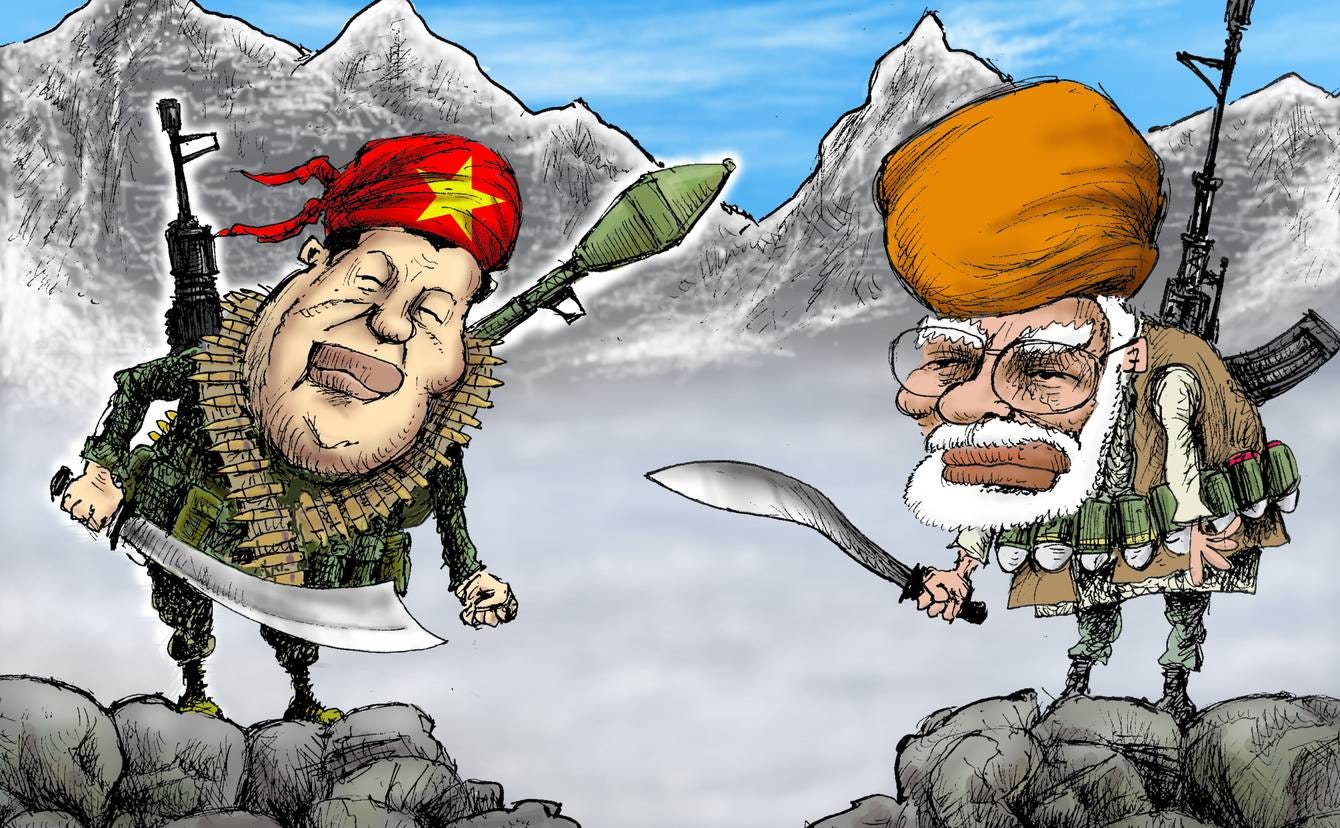Dear fellow China Watchers
After a brief hiatus from analysing China’s relationship with different parts of the world - last week I discussed the country’s impact on Western concepts of Cosmopolitanism, and the week before Alexander Wood and I examined Beijing’s global control of Rare Earths - this week we are starting a new mini-series on China and South East Asia.
To kick things off I’m delighted to publish an interview I recently did with one of South East Asia’s leading academics and diplomats, Kishore Mahbubani.
Kishore has had an exemplary career. He spent 33 years in the Singaporean Foreign Service, rising to be the President of the United Nations Security Council, and since 2004 has been in academia. He is currently a Distinguished Fellow at the Asia Research Institute (ARI) here in Singapore, and a globally recognised thinker on China. He has recently written a book called Has China Won?.
With Singapore’s self-declared neutrality in the growing clash between China and America and its allies, Kishore is perfectly placed to look at how the contest is playing out from an Asian point of view. Some of his conclusions might seem a little surprising for those who are looking at it from a Western perspective, and there will be those that disagree. But it is important to understand how thinkers in South East Asia, an increasingly important part of the world, see what I call the Great Competition.
Before I get to the interview, however, I want to mention another set of interesting views from the diplomatic community that surfaced this week: a staggering interview with the Chinese Ambassador to France. (If you don’t read Chinese, it’s best to view it in Chrome so you can auto-translate it.)
It puts in black and white exactly how and why China’s diplomats are embarking on such a vigorous round of so-called “Wolf Warrior” diplomacy. To sum it up, China feels that it is now big enough not to be pushed around; it thinks the West is all brainwashed against it by the Western media; and Wolf Warrior diplomacy is needed to aggressively put an assertive China’s view across.
I’m moving house so may not get around to publishing anything next week, but if not I will be back the week after to continue our look at China’s relationship with South East Asia.
In the meantime, please do consider commenting, liking, and subscribing.
Many thanks for reading.
***
Sam Olsen: How do you rate President Biden’s first few months in terms of America’s relationship with China?
Kishore Mahbubani: As I wrote in the first line of my book [Has China Won?], “the geopolitical contest that has broken out between America and China will continue for the next decade or two”. But I’m disappointed that the Biden Administration hasn’t stepped back and done a strategic overhaul of the China policy. They need to work out what is and isn’t working, to press pause and change some of the non-productive policies like the trade sanctions. This is the time to put new China policies in place.
That said, the Biden Administration’s hands are tied because any signs of softness will bring him considerable difficulty given the political climate in America: China is now a bipartisan issue.
Unfortunately, the US doesn’t have a long-term strategy for China. If it is to have one, the first thing it needs to do is to set its goals. For example, are they trying to contain China? If so, that will be difficult because of the strides China has taken, such as now being the leading trade partner with more countries than America is.
Another goal they could choose is to overthrow the Chinese Communist Party (CCP). But that is not really possible, and internal support for the CCP is increasing.
A third goal might be to stop China’s economy from getting to number one. But this simply can’t be done.
In other words, what is the US trying to achieve when it comes to China?

SO: You have long taken a positive view about China and its future, are you still as positive as you once were given its new Wolf Warrior stance?
KM: At first, I thought that China’s Wolf Warrior diplomacy had damaged relations with other countries, for example in Europe, but after reflecting on it I think that it is good for the world that China is being more of a Wolf Warrior. There is a greater danger of China remaining quiet, which would lead to its people and its leaders becoming angrier and angrier. My big message for the West is that when China emerges as the number one economy, we want to avoid it becoming an angry dragon.
On the other hand, the West is shooting itself in the foot by insulting China, for example when Trump and Pompeo lectured them and launched sanctions. Beijing doesn’t believe that the West is doing all this grandstanding about China from a moral position. Instead, what they think is that when China was weak it was kicked around by the West, but now the country is strong the Western governments have decided to care about human rights there. Thus, many in China think it is a cynical ploy by the West.
We must get used to the fact that China is different now, and is actually bigger than the US in terms of its GDP PPP [purchasing power parity]. As such, China cannot be expected to behave as it did in the past.
In sum, China is trying to get the US to treat it as an equal. The West now has to decide whether it is in its interest to work with China as it is, or to try and change it.
SO: What do you think the chances of US-China conflict in the coming years, for example over Taiwan?
KM: Overall, I feel that war is not very likely because we are dealing with two nuclear powers. But one issue concerns me, and that is Taiwan. The US has to realise that there are some Chinese red lines, so if the Taiwanese government goes for independence and the US supports it, then Beijing will go to war.
However, there is good news in terms of what the Biden Administration has recently done with Taiwan. Rather than continue with Trump’s policy of sending current serving officials in government, which was a break from tradition, Biden sent a delegation to Taiwan with top notch retired personnel. This showed Beijing that he was sticking to the traditional American relationship with Taiwan (the One China policy) rather than trying to change things, as Trump did.
As the writer Peter Beinart recently asked, in the New York Times, how much is America willing to sacrifice in order to defend Taiwan?
SO: Assuming conflict in some way comes, how would Southeast Asia respond? How would India respond?
KM: If there was a war between China and America, ASEAN [the Association of Southeast Asian Nations] won’t take sides. Prime Minister, Lee Hsien Loong, has made it clear that Singapore wants to maintain good relations with both the US and China. India and China have seen their relationship change over the years, mainly because China has changed so much: in 1980 both sides had the same GDP, but now China’s economy is five times the size of India.
Despite a recent warming of relations, India will never become an ally of the US. This is because it feels that it is big enough to not have to take sides, even if it is getting closer to Washington. There have also been recent negotiations between New Delhi and Beijing, because in the long run, no matter the state of relations between the two Asian giants now, there has to be a solution to their argument at some point. The trouble is, a solution will most likely mean having to redraw the maps of the border between them, which will take strong leadership.

SO: What is the room for manoeuvre for the UK in Asia given the China-US competition?
KM: There are different opportunities for EU and UK. For the EU it will be mainly economic. For the UK it will be economic too, but the country also has an unusual diplomatic opportunity: to be the bridge between the US and China.
During the Cold War, Australia helped the US in Southeast Asia by being a bridge and helping the Americans to understand what was going on. Unfortunately, Australia has burnt its bridges with China recently, but the UK hasn’t. Washington trusts London, and China does too, to some extent, so the UK can help to bring the superpowers together.
It’s important to realise that no Asia country thinks China can be stopped; even Japan and South Korea are quietly preparing for working with China more. The UK understands the region and can pick up the nuances – like with Japan and Korea – and help to explain this to the US.



